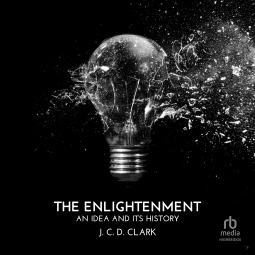
The Enlightenment
An Idea and Its History
by J. C. D. Clark
Narrated by Mike Cooper
This title was previously available on NetGalley and is now archived.
Buy on Kobo
Buy on Libro.fm
*This page contains affiliate links, so we may earn a small commission when you make a purchase through links on our site at no additional cost to you.
Send NetGalley books directly to your Kindle or Kindle app
1
To read on a Kindle or Kindle app, please add kindle@netgalley.com as an approved email address to receive files in your Amazon account. Click here for step-by-step instructions.
2
Also find your Kindle email address within your Amazon account, and enter it here.
Pub Date Dec 24 2024 | Archive Date Dec 31 2024
Talking about this book? Use #TheEnlightenment #NetGalley. More hashtag tips!
Description
There are many books claiming to explain the Enlightenment, but most assume that it was a thing. J. C. D. Clark shows what it actually was, namely a historiographical concept.
The Enlightenment: An Idea and Its History provides a critical historical analysis of the Enlightenment in England, Scotland, France, Germany, and the United States from c. 1650 to the present. It argues that the degree of commonality between social and intellectual movements in each—and, more broadly, between the five societies—has been overstated for polemical purposes. Clark shows that the concept of 'the Enlightenment' was not widely adopted in those societies until the mid-twentieth century; indeed, that it was unknown in the eighteenth. Without the concept, people at the time were unable to act in ways that would have created the Enlightenment as a coherent movement. Since the conventional account has held that the Enlightenment was a phenomenon, the idea could be used as a component of what has been called a 'civil religion': a summing up of the myths of origin, aims, and essential values of a society from which dissent is not permitted. An appreciation that it was instead a historiographical concept undermines, in turn, the idea that there was any great transition to what came to be called 'modernity'.
The Enlightenment: An Idea and Its History provides a critical historical analysis of the Enlightenment in England, Scotland, France, Germany, and the United States from c. 1650 to the present. It argues that the degree of commonality between social and intellectual movements in each—and, more broadly, between the five societies—has been overstated for polemical purposes. Clark shows that the concept of 'the Enlightenment' was not widely adopted in those societies until the mid-twentieth century; indeed, that it was unknown in the eighteenth. Without the concept, people at the time were unable to act in ways that would have created the Enlightenment as a coherent movement. Since the conventional account has held that the Enlightenment was a phenomenon, the idea could be used as a component of what has been called a 'civil religion': a summing up of the myths of origin, aims, and essential values of a society from which dissent is not permitted. An appreciation that it was instead a historiographical concept undermines, in turn, the idea that there was any great transition to what came to be called 'modernity'.
Advance Praise
"A magnificent sweep of intellectual history over the long eighteenth century 1660 to 1832 and into the modern era." —John Redwood, John Redwood's Diary
"A magnificent sweep of intellectual history over the long eighteenth century 1660 to 1832 and into the modern era." —John Redwood, John Redwood's Diary
Available Editions
| EDITION | Audiobook, Unabridged |
| ISBN | 9781696616577 |
| PRICE | $29.99 (USD) |
| DURATION | 19 Hours, 26 Minutes |
Available on NetGalley
NetGalley Shelf App (AUDIO)



